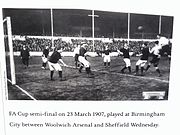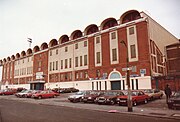
The 2006–07 FA Cup was the 126th staging of the world's oldest football knockout competition; the FA Cup. This season's edition was the first to be sponsored by E.ON.

The 1974 FA Cup final was an association football match between Liverpool and Newcastle United on Saturday, 4 May 1974 at Wembley Stadium, London. It was the final match of the 1973–74 FA Cup, the 93rd season of England's primary cup competition, the Football Association Challenge Cup, better known as the FA Cup. Liverpool were appearing in their fifth final and Newcastle in their eleventh, which was a record at the time. Liverpool had won the FA Cup once, in 1965, and Newcastle six times, most recently in 1955.
The 1977 Football League Cup Final was played between Aston Villa and Everton and required three games to decide the winner, the only time this has happened in the League Cup. The first match took place at Wembley Stadium on 12 March and the game ended in a goalless draw. The replay on 16 March was only marginally better as the teams again played out a draw, this time at Hillsborough the home of Sheffield Wednesday. The game ended 1–1 with both goals scored by Everton players with Bob Latchford's last-minute equaliser nullifying Roger Kenyon's earlier own-goal.
The history of the FA Cup in association football dates back to 1871–72. Aside from suspensions during the First and Second World Wars, the competition has been played every year since.
The 2004–05 FA Cup was the 124th season of the world's oldest football competition, the FA Cup. The competition began on 28 August 2004, with the lowest-ranked of the entrants competing in the Extra preliminary round. For England's top 44 clubs, from the 2004–05 Premier League and 2004–05 Football League Championship, the FA Cup began at the third round in January.
The 2003–04 FA Cup was the 123rd staging of England and the world's oldest football competition, the FA Cup. The competition began on 23 August 2003, with the lowest-ranked of the entrants competing in the Extra preliminary round. In the third round, the clubs from the Premiership and Division One competed in the competition for the first time.
The 1992–93 FA Cup was the 112th season of the FA Cup, also known as The Football Association Challenge Cup. It was won by Arsenal, who beat Sheffield Wednesday 2–1 in the replay after a 1–1 draw in the final at the old Wembley Stadium. The goals were scored by Ian Wright and Andy Linighan, who scored in the 119th minute. This was the last FA Cup final to be decided by a replay before final replays were abolished in 1999.
The 1997–98 FA Cup was the 117th staging of the FA Cup. The competition was won by Arsenal with a 2–0 victory against Newcastle United at Wembley Stadium.
The 1993–94 FA Cup was the 113th staging of the world and England's oldest cup competition, the Football Association Cup or FA Cup. The competition overall was won by Manchester United for the first time since 1990, with a 4–0 thrashing of Chelsea.
The 1994–95 FA Cup was the 114th staging of the FA Cup. The competition was won by Everton, with a shock victory over Manchester United, who were strong favourites to retain the title. This tournament was the 50th to be officially held since the six-year suspension due to World War II. Everton's Joe Royle would be the last English-born manager to lift the FA Cup until Harry Redknapp managed Portsmouth to the 2008 victory. As of 2023, this is the most recent major trophy won by Everton.
The 1995–96 FA Cup was the 115th staging of the FA Cup. The competition was won outright by Manchester United, who won the final through a goal from Eric Cantona five minutes from the end of the game. It gave Manchester United a league and cup double after they secured their third league title in four years. It was also United's third straight FA Cup Final.
The 1996–97 FA Cup was the 116th season of the FA Cup. The tournament started in August 1996 for clubs from non-league football and the competition proper started in October 1996 for teams from the Premier League and the Football League.
The 1955–56 FA Cup was the 75th staging of the world's oldest football cup competition, the FA Cup. Manchester City won the competition, beating Birmingham City 3–1 in the final at Wembley, London.
The 1945–46 FA Cup was the 65th season of the world's oldest football cup competition, the Football Association Challenge Cup, generally known as the FA Cup, and the first to be held after the Second World War. Derby County were the winners, beating Charlton Athletic 4–1 after extra time in the final at Wembley, London. The tournament witnessed a disaster in the sixth round when, during the second leg of the Bolton–Stoke City tie, 33 people were crushed to death in the Burnden Park disaster.
The 1991–92 FA Cup was the 111th season of the world's oldest knockout football competition, The Football Association Challenge Cup, or FA Cup for short. Liverpool beat Sunderland 2–0 in the final to take their 5th FA Cup trophy.
The 1988–89 FA Cup was the 108th season of the world's oldest football knockout competition, The Football Association Challenge Cup, or FA Cup for short.
The 1973–74 FA Cup was the 93rd season of the world's oldest football cup competition, the Football Association Challenge Cup, commonly known as the FA Cup. Liverpool won the competition for only the second time, beating Newcastle United 3–0 in the final at Wembley, London.
The 1969–70 FA Cup was the 89th season of the world's oldest football cup competition, the Football Association Challenge Cup, commonly known as the FA Cup. First Division Chelsea won the competition for the first time, first drawing with Leeds United 2–2 in the final at Wembley, before winning 2–1 in the replay at Old Trafford.
The 1957–58 FA Cup was the 77th staging of the world's oldest football cup competition, the Football Association Challenge Cup, commonly known as the FA Cup. Bolton Wanderers won the competition for the fourth time, beating Manchester United 2–0 in the final at Wembley. The competition is notable for the exploits of Manchester United following the loss of much of their team in the Munich air disaster on 6 February 1958. They came through three rounds following the accident, before being beaten by Bolton in the final.
The 1993–94 Football League Cup was the 34th Football League Cup, a knockout competition for England's top 92 football clubs.



















